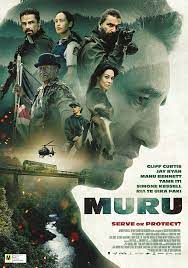
MURU
New Zealand, 2022, 104 minutes, Colour.
Cliff Curtis, Jay Ryan, Manu Bennett, Simon Kssell, Tame Iti, Roimata Fox, Ria Paki, Poroaki Merrit-McDonald, Xavier Horan.
Directed by Tearepa Kahi.
This is a striking New Zealand drama, raising pressing issues of traditional Maori culture, colonial backgrounds, some paranoia, the role of political authorities and special police units.
At the beginning, there is a statement that the police do not support the activities portrayed in the film. And we wonder what this could mean. In fact, the screenplay is fictitious but is grounded in three episodes, one in 1916, a shooting in 2000, a siege and pursuit in 2007, all victimising Maori people, and heavy-handed and violent intervention by the authorities.
It is something of a surprise when we see a local group climbing a mountain, holding a meeting, telling stories, local language, a boot camp for identity and survival skills, and a brash young man causing problems, Rusty. And then we see that this meeting, seemingly remote, is actually under surveillance from several hidden heat cameras. The leader, played by Tame Iti as himself, is suspected of subverting a group with the aim of killing the Prime Minister.
But, down the mountain, in the quiet village of Ruatoki, things seem calmer. We see Tash (played by internationally successful actor, Cliff Curtis) driving the local school bus as well as carefully attending to his ageing father who is on dialysis. And we learn that he is a member of a local police unit. In the meantime, Rusty has shown himself a rebel, smashing the glass windows of the bakery, but under the care of his parents – but the authorities taking this as further evidence of rebellious action. And, when he is seen on horseback with a broom, going to clean up the mess at Tash’s request, the surveillance team interpret that he has a weapon and pursue him.
There are complications, misunderstandings, continuous police surveillance, phone calls to Wellington to the Minister (who is aggressive and face-saving at the same time), and the introduction of the STG, the New Zealand police Special Tactics Group, led by the earnest Gallagher (Jay Ryan), who has struggles with his strict sense of duty and some human compassion, unlike his aggressive, trigger-happy associate, Kimiora (Manu Bennett). Also involved is Tash’s police associate, Blake (Ria Paki), Maria who is on the surveillance squad, Rusty’s parents who are driving him after he is shot for treatment by the local travelling doctor.
Most audiences will easily identify with Tash, his sense of duty, his pleasing care of the children on the bus who are left stranded, his upset when his father is taken by the police, his concern for Rusty, his finally being arrested, put on a pursuit helicopter with Gallagher and Kimiora as they chase Rusty. And some unexpected drama ensues.
While there is some underlying anger in the treatment of these unjust memories about the people, the police, government authorities, the film just develops its characters, their interactions, voicing the concerns, and presents the action crises so that the audience becomes involved and has sufficient grounds for making their judgements about what happened – and the ever-present tragedies in racial prejudice and aggression.
- The title? Maori languages? The meaning of forgiveness?
- The bases of the plot, the episode in 1916, the shooting in 2000, the attack on the village in 2007, alleged protest, plots to kill the Prime Minister? A fictional incorporation of each of these elements?
- The police statement at the beginning, not endorsing this kind of police activity?
- The location photography, North Island, the village and lifestyle, homes, school, the countryside, mountains, rivers? The musical score?
- The introduction to the characters, climbing the mountain, the gathering, survival, morale boosting, the leader (played by the actual leader), his facial figurations? The language, the enthusiasm, men and women, the boot camp, Rusty and his reactions, the shot?
- The revelation that this was all being covered by official surveillance, the police, hidden cameras?
- The introduction to Taff, at home, driving the bus, with the kids, one of the local police? His visits to his father and his care for him? The father, illness and need for dialysis? Blake, the other member of the local police team?
- The Special Tactics Group, the surveillance, the information, the interpretation, protest and uprising, the phone calls to the Minister, his attitudes, interpretation, decisions, hostile?
- The personalities of the leaders, Gallagher and Kimiora, the female surveillance member? The team? Orders, tactics, harsh and hard?
- Rusty’s story, drinking, wandering, breaking the windows of the bakery, returning to his parents, Taff and the reprimands, getting him to repair the windows, Rusty on his horse, the broom and the photos, interpreted as a weapon? The pursuit? Accosting him, confrontations, his being shot, getting away? His parents and the truck? Taff and Blake helping? Maria, her intervention, her being taken, held in the vehicle?
- The news that the leader was taken, his work with the bees? The news that Taff’s father was taken, held, bag over the head? The camera communication? Taff and his reaction?
- Rusty, in the vehicle, the contact with the local doctor, her caravan, the driving to meeting, the helicopter and pursuit?
- Taff taken, the headquarters, his father? The different attitudes of Gallagher and Kimiora? Taff in the helicopter, trying to save Rusty? The struggle with Kimiora, falling from the helicopter? The gun? Taff and his injuries?
- The role of the police informer, Kimiora and his shooting? The rescue of Rusty, after their shooting the car and killing his father? Blake and Maria?
- Taff, the injuries, saving Rusty, his death?
- Reminders of the colonial past, the consequences, contemporary villages and communities, under suspicion? The authorities and harsh interpretations?